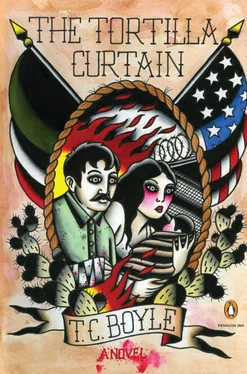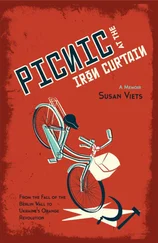T. Boyle - The Tortilla Curtain
Здесь есть возможность читать онлайн «T. Boyle - The Tortilla Curtain» весь текст электронной книги совершенно бесплатно (целиком полную версию без сокращений). В некоторых случаях можно слушать аудио, скачать через торрент в формате fb2 и присутствует краткое содержание. Год выпуска: 2011, Издательство: Penguin Books, Жанр: Современная проза, на английском языке. Описание произведения, (предисловие) а так же отзывы посетителей доступны на портале библиотеки ЛибКат.
- Название:The Tortilla Curtain
- Автор:
- Издательство:Penguin Books
- Жанр:
- Год:2011
- ISBN:нет данных
- Рейтинг книги:4 / 5. Голосов: 1
-
Избранное:Добавить в избранное
- Отзывы:
-
Ваша оценка:
- 80
- 1
- 2
- 3
- 4
- 5
The Tortilla Curtain: краткое содержание, описание и аннотация
Предлагаем к чтению аннотацию, описание, краткое содержание или предисловие (зависит от того, что написал сам автор книги «The Tortilla Curtain»). Если вы не нашли необходимую информацию о книге — напишите в комментариях, мы постараемся отыскать её.
The Tortilla Curtain — читать онлайн бесплатно полную книгу (весь текст) целиком
Ниже представлен текст книги, разбитый по страницам. Система сохранения места последней прочитанной страницы, позволяет с удобством читать онлайн бесплатно книгу «The Tortilla Curtain», без необходимости каждый раз заново искать на чём Вы остановились. Поставьте закладку, и сможете в любой момент перейти на страницу, на которой закончили чтение.
Интервал:
Закладка:
For now, though, there was nothing to do but wait. She crossed the lot, clutching the bills in her hand, and found an inconspicuous perch on a tree stump at the corner of the building. From here she could watch the lot for Cándido and stay out of the way-all those _gringos__ made her nervous. Every time a car swung into the lot she felt her heart seize. She couldn't help thinking of _La Migra__ and those tense silent men in the tan uniforms who'd ministered over the worst night of her life, the night she'd been stripped naked in front of all those people, though Cándido assured her they wouldn't find her here. The chances were small. Minuscule. But she didn't like chances, any chances, and she shrank into the vegetation and waited.
An hour went by. She was bored, scared, beginning to imagine all sorts of calamities: Cándido had been picked up by the police, he'd gone back to the canyon and stepped into a nest of rattlesnakes, another car had hit him and he lay bleeding in the bushes. From there her mind took her to their camp-maybe he was down there now, starting the fire, warming the stew-and then to the stew itself, and her stomach turned inside out and gnawed at her. She was hungry. Ravenous. And though the store intimidated her, the hunger drove her through the doors with her money and she bought another tin of sardines and a loaf of the sweet white bread that was puffed up like edible clouds and a Twix bar for Cándido. She was afraid someone would speak to her, ask a question, challenge her, but the girl at the checkout stand stared right through her and the price-$2.73-showed in red above the cash register; sparing her the complication of having to interpret the unfathomable numbers as they dropped from the girl's lips. Outside, back on her stump, she folded the sardines into slices of bread and before she knew it she'd eaten the whole tin. Her poor bleached fingers were stained yellow with the evidence.
And then the sun fell behind the ridge and the shadows deepened. Where was Cándido? She didn't know. But she couldn't stay here all night. She began to think about their camp again, the lean-to, the stewpot, the blanket stretched out in the sand, the way the night seemed to settle in by degrees down there, wrapping itself round her till she felt safe, hidden, protected from all the prying eyes and sharp edges of the world. That was where she wanted to be. She was tired, enervated, giddy from breathing fumes all day. She rose to her feet, took a final glance around and started off down the road with her bread, the Twix bar and her twenty-two dollars and twenty-seven cents all wrapped up in the brown plastic bag dangling from her wrist.
At this hour, the traffic had slowed considerably. The frenetic stream of cars had been reduced to the odd vehicle here and there, a rush of air, a hiss of tires, and then the silence of the canyon taking hold of the night, birds singing, the fragment of a moon glowing white in a cobalt sky. She looked carefully before crossing, thinking of Cándido, and kept to the edge of the shoulder, her head down, walking as fast as she could without drawing attention to herself. By the time she reached the entrance of the path she was breathing hard, anxious to get off the road and hide herself, but she continued past it, slowing her pace to a nonchalant stroll: a car was coming. She kept her head down, her footsteps dragging, and let it pass. As soon as it had disappeared round the bend by the lumberyard, she retraced her steps, but then another car swung round the curve coming toward her and she had to walk past the trailhead again. Finally there was a respite-no one coming either way-and she ducked into the bushes.
The first thing she did was relieve herself, just like last night. She lifted her dress, squatted over her heels and listened to the fierce impatient hiss of the urine as the light settled toward dusk and the smell of the earth rose to her nostrils. A moment ago she'd been out there on the road, exposed and vulnerable-frightened, always frightened-and now she was safe. But the thought of that frightened her too: what kind of life was it when you felt safe in the bushes, crouching to piss in the dirt like a dog? Was that what she'd left Tepoztlan for?
But that was no way to think. She was tired, that was all. Her shoulders ached and her fingers burned where the skin was peeling back from her nails. And she was hungry, always hungry. If she'd stayed in Tepoztlán through all the gray days of her life she would have had enough to eat, as long as her father was alive and she jumped like a slave every time he snapped his fingers, but she would never have had anything more, not even a husband, because all the men in the village, all the decent ones, went North nine months a year. Or ten months. Or permanently. To succeed, to make the leap, you had to suffer. And her suffering was nothing compared to the tribulations of the saints or the people living in the streets of Mexico City and Tijuana, crippled and abandoned by God and man alike. So what if she had to live in a hut in the woods? It wouldn't be for long. She had Cándido and she'd earned her first money and now Cándido was able to work again and the nightmare of the past weeks was over. They'd have a place by the time the rains came in the fall, he'd promised her, and then they'd look back on all this as an adventure, a funny story, something to tell their grandchildren. _Cándido__, she would say, _do you remember the time the car hit you, the time we camped out like Indians and cooked over the open fire, remember?__ Maybe they'd have a picnic here someday, with their son and maybe a daughter too.
She was holding that picture in her head, the picnic basket, one of those portable radios playing, a little boy in short pants and a girl with ribbons in her hair, as she worked her way down the trail with her brown plastic bag. Pebbles jumped away from her feet and trickled down the path ahead of her like water down a streambed. There was a clean sharp smell of sage and mesquite and some pale indefinable essence that might have been agave. There were certainly enough agave plants scattered across the slopes, their huge flowering stalks like spears thrown from the sky. Did they have a scent? she wondered. They had to, didn't they, to attract the bees and hummingbirds? She'd have to get up close and smell one sometime.
She had almost reached the place where the big rounded spike of rock stuck out of the ground when a sudden noise in the undergrowth startled her. Her eyes darted to the path in front of her and she caught her breath. She had a fear of snakes, especially when the light began to fail and they came out to prowl, their coarse thick evil-eyed bodies laid alongside the trail like sticks of wood, like shadows. But this was no snake, and she had to laugh at herself even as the first of the quail, slate heads bobbing, scuttered across the path with a rasp of dead leaves. Cándido was forever trying to snare the little birds but they were too quick, folding themselves into the brush or crying out like scared children as they spread their wings and shot up over the bushes and down the canyon to safety. She stopped a moment to let them pass, the chicks at their heels, and then she stepped into the deep purple shadow cast by the rock.
He was waiting there for her, with his hoarse high voice and his skin that was like too much milk in a pan of coffee, with his hat turned backwards on his head like a _gringo__ and the raw meat of his eyes. There was another man with him, an Indian, burnt like a piece of toast. They were sitting there, perched on blunt stools of sandstone, long silver cans of beer dangling from their fingertips. “Well, well,” he said, and his face was expressionless in the smothered light, _“buenas noches__, _señorita?__-or should I say _señora?__ Yes? Right?” And he threw it back at her: “Married woman.”
Читать дальшеИнтервал:
Закладка:
Похожие книги на «The Tortilla Curtain»
Представляем Вашему вниманию похожие книги на «The Tortilla Curtain» списком для выбора. Мы отобрали схожую по названию и смыслу литературу в надежде предоставить читателям больше вариантов отыскать новые, интересные, ещё непрочитанные произведения.
Обсуждение, отзывы о книге «The Tortilla Curtain» и просто собственные мнения читателей. Оставьте ваши комментарии, напишите, что Вы думаете о произведении, его смысле или главных героях. Укажите что конкретно понравилось, а что нет, и почему Вы так считаете.












